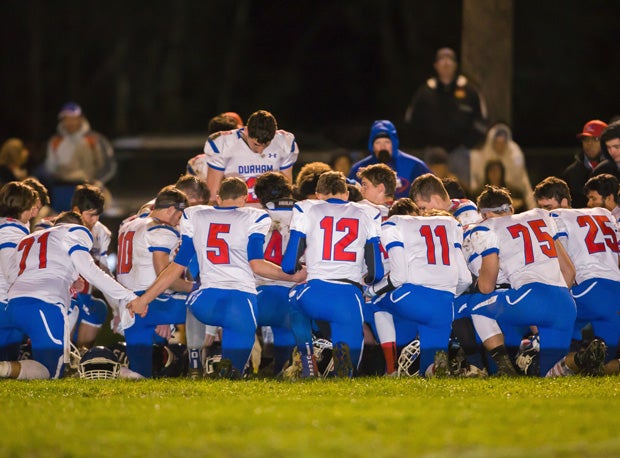Video: Tyreko Mattox's highlights Chico High School
Creating a group of team leaders is key to developing long-lasting success.
If you were to ask most coaches what's most frustrating thing about coaching in 2017, you'd probably get an answer that has something to do with athletes who only care about themselves, or they care more about themselves than the team. The answer might be along the lines of transfers, because athletes are not satisfied with their playing time. It might be club football; the club coach is telling the kid they are great, so they have that mentality with your program. No matter the case, a "me first" attitude is a very difficult thing to overcome these days.
Creating a team-first mindset is one of the most important jobs of coaches. Here are three keys to creating team first mindset.
1. Team rules must apply to the team Nothing ruins the team-first environment if rules don't apply to everybody. That all-league linebacker who isn't showing up for workouts, or that Division I recruit who shows up 10 minutes late to every practice not having to pay a price for their misdeeds sends a major message to the rest of the team that "me first" is OK ... depending on who you are. Make sure to apply your team policies and procedures evenly. That helps, more than anything in my opinion, to create a team-first mindset.

Creating a team-first mentality is crucial to lasting success.
Photo by Ralph Thompson
There are two ways to treat the non-starters in your program. I've been around high school football for 20 years – four as a player and 16 as a coach. I have been part of six different programs during these 20 years, and have seen head coaches go down totally different roads on how to treat non-starters.
The head coach has to take a proactive approach to treating every kid on the team with the same attitude and mentality. Make sure that your backups have roles, understand their roles and are appreciated for the roles they play. This helps them to understand that the team is more important than the stars.
My high school coach used a program called the "Kodak Player of the Week." Kodak was a film company back in the day; the scout team was to "give a picture" of the opponent. The Kodak Player of the Week was a big deal to our program. At the frosh level, that kid would start. This program made every player feel important, and that the team was first.
3. The most important leadership comes from the team, not the coaching staffAs a rookie head coach, I made the mistake of being "the leader" of the program. I led with a hammer and a fist – it was my way or the highway – and I made sure everybody knew that. It didn't go well. The most important lesson about leadership I've learned since that first year is that team leadership really needs to be about the kids. Our role as coaches is to develop great leadership among the players.
Players need to take ownership of the team, its policies and procedures. The most successful teams I have coached understood this. They were great team-first teams because the seniors took control of the team and made sure that the team came before every individual.
If all team rules are applied evenly, every player in the program feels that the team is more important than the stars and the most important leadership in the program comes from the players, I'm convinced the mentality in your program will be team first, not me first.
Chris Fore is a veteran Head Football Coach and Athletic Director from Southern California. He consults coaches and programs nationwide through his business Eight Laces Consulting.
